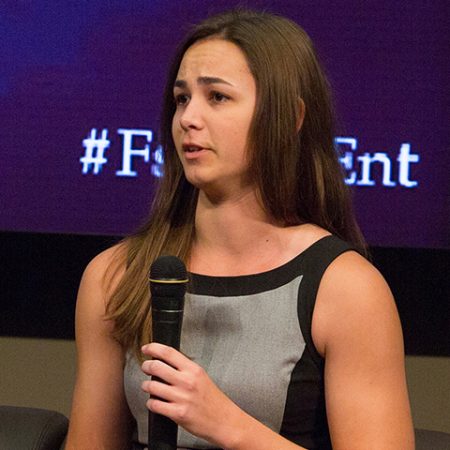
Nearly 200,000 migrant and seasonal workers come to work in Florida every year, and finding high quality, affordable housing is one of their chief challenges. Florida State University’s DeVoe L. Moore Center is addressing this difficult problem with an innovative, private sector solution that could help workers and growers in 33 Florida counties.
A two-year privately funded grant is allowing the center to hire FSU economics graduate Kaylee Tuck as a full-time policy analyst dedicated to developing a working business model for Walks of Life Hotel, a project that will renovate large vacant buildings, such as abandoned hotels into self-sustaining, affordable housing for migrant workers.
Growing up on her family’s farm in Sebring, Fla., Tuck saw firsthand the housing challenges faced by local migrant workers. Federal law requires growers to set aside funding for migrant worker housing, but the quality and affordability of the homes remains inferior. In addition, the conventional housing market continues to avoid this sector.
The expectation is to launch the Walks of Life Hotel over the last half of 2016, with the capability to provide housing for more than 200 migrant workers in Sebring or a nearby town or county.
Tuck’s first year will be focused on developing a full business plan for the innovative project while also researching its application outside the state of Florida, most likely a northern state with a high migrant worker population. Her second year will focus on implementation.
“The successful implementation of this project is of the utmost importance to me because I have grown up witnessing the abysmal conditions that migrant workers are subjected to,” said Tuck, who started working full-time on the project in January. “I plan on seeing this project through in the interest of creating a better quality of life for a group of people who are essential to the well-being of our state.”
Tuck’s idea was forged in a senior seminar on social entrepreneurship at Florida State University. The social entrepreneurship model Tuck used shows financial credibility and serves as an innovative approach to providing neglected infrastructure at the lower rungs of the housing market.
Through this project, the DeVoe Moore Center hopes to establish a sustainable framework that can be applied on a national level to provide housing to low-income workers and their families.
“This is an exciting example of how Florida’s universities can tap into the innovation and creativity of its residents,” said Joanna Douglas, project manager for the Diehl Family Social Enterprise Competition at Florida State University. “Social entrepreneurship is revolutionizing the way we are providing core services to populations not well served by conventional markets. Kaylee’s project represents the resourceful thinking that can challenge our understanding of what is possible and practical.”
In addition to Tuck’s project, the Diehl Competition also awarded first-year seed money grants to new social enterprises in West Virginia, Nepal, Uganda and Haiti based on an international call for ideas that generated more than 120 proposals.



